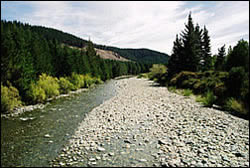Sustaining ecosystem services
Research Status: Past |
Placeholder |
Introduction
Production, recreation, employment and community well-being in the Motueka River catchment are fundamentally dependent on the ecosystem services (water purification, soil stability, plant nutrition, pollination etc) provided by the natural assets of the catchment (soil, vegetation, biota, etc). Investing in maintaining and enhancing those essential services is a resource management goal that focuses on maximising mutual benefit. The relative importance of ecosystem services and ways of increasing investment in their maintenance are not well understood.
Resource management in New Zealand has made significant strides in the past 10 years but has been unable to shift away from a focus on 'bads' - effects that need avoiding, mitigating, or remedying. This approach perpetuates conflict between resource users and places resource managers in the role of environmental police whose primary role is to protect, constrain, and punish. Arguably, however, natural resource problems can be traced to the failure of markets to reward land holders for the provision of ecosystem services.
A shift in focus and approach to sustaining ecosystem services provides an opportunity to encourage and enhance 'goods' and opens up the possibility of drawing on a much wider range of investment for environmental management and nature conservation. There is already a sophisticated system of philanthropic and commercial investment in the arts and other community-based enterprises. Some of these resources are already flowing into environmental protection (e.g. Project Crimson, Kiwi recovery, Hoiho protection) but there is considerably greater potential.
The Kyoto protocol has generated the potential for a market in carbon credits. Similar credit-based markets in wetland restoration, water quality, and biodiversity are operating or under consideration in the US and Australia.
Research Approach
To prepare an inventory of market and non-market 'goods' produced in the Motueka River catchment, and the natural assets and ecosystem services this production is dependent upon, and to build the capacity of the local community to implement strategies for sustaining ecosystem services.
The following steps are some of those that are necessary:
1. Document the key land uses and industries in the catchment and their contribution to the local economy.
2. Document the environmental services provided by the catchment, the natural assets they are derived from, their importance as an input to production, their role in maintaining the natural assets of the catchment, and the key pressures on the continued provision of that service.
3. Develop measures for quantifying the benefits derived from ecosystem services in terms of a single index or 'credit' per outcome.
4. Work with the local community to quantify the benefits of various management practices in addressing ecosystem service issues.
5. Work with Local and Central Government to develop pathways for more effective delivery of programs by linking national policy, catchment scale natural resource management targets, and on-ground projects and works.
Research Results
This project would improve the efficiency of existing natural resource management programmes by government, test the potential to raise non-government sector investment in the environment, and build the capacity of regional communities to develop and initiate markets for ecosystem services including water quality and biodiversity.
It would do this by using an understanding of ecosystem services as the basis for improving the capacity of local government and communities to target on-ground works such as soil conservation and riparian management to deliver natural resource management outcomes at a regional scale, and by examining the design of institutions, markets, and incentives that can engage and reward landholders at a sufficient scale to secure investment in changes in land management.
Recent Publications
Recent Presentations
| Year | Title | File Size |
| 2006 | Participation of indigenous groups in sustainable development monitoring: rationale and examples from New Zealand |
|
BMPs, BEPs and Guidelines
| Title | Description |
| Southland’s Wetlands assessment Guide | A tool kit for use by landowners that includes practical advice and assistance to encourage the main...More » |
| Sustainable Management of Native Vegetation Areas in South Marlborough |
From manual: Guidelines for landowners to develop a management plan for the sustainable manage...More » |
| Information on key sustainable farming topics |
From website: A table designed to help find information/publications that are related to whole...More » |
| Standards and Guidelines for Sustainable Management of Indigenous Forests |
From guide: MAF Standards and Guidelines for sustainable management of New Zealand indigenous ...More » |
| The National Standard for Environmental Certification of well–managed Plantation Forests in New Zealand | Outlines the National Standard for environmental certification of plantation forests. It provides f...More » |
| Using Gravel Extraction to Restore Floodway Ponds | Guidelines for restoring floodway ponds...More » |
| Using Gravel Extraction to Restore Oxbow Lakes | Guidelines for restoring oxbow lakes for flood protection...More » |
| Using Gravel Extraction to Restore River Channels | Guidelines for river channel restoration for flood control measures...More » |
| Protecting and Restoring our Natural Heritage – a Practical Guide |
From website: This guidebook provides information on protection, management and restoration of...More » |
| Coastal Erosion Management Manual |
From website: The Coastal Erosion Management Manual presents information and advice to assist ...More » |
Primary Contacts:

|
Andrew Fenemor
Email Phone: 03 545 7710 More details» |
Institute Landcare Research |
Expertise ICM programme management; local liaison; resource management; hydrology and water resource management |